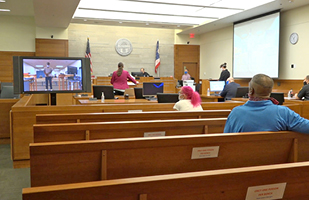Remote Technology, Testimony Part of Latest Rule Updates

The expansion of virtual court proceedings, including recorded testimony, is part of the most recent changes to the Rules of Superintendence.

The expansion of virtual court proceedings, including recorded testimony, is part of the most recent changes to the Rules of Superintendence.
The Supreme Court of Ohio has revised the Rules of Superintendence for the Courts of Ohio to promote modernization, efficiency, and delivery methods of state courts.
The primary rule changes expand remote technology possibilities for local courts, including virtual hearings, and enable litigants to use recorded testimony and evidence. The changes go into effect on July 1.
The amendments were developed by the Task Force on Improving Court Operations Using Remote Technology (iCOURT). The group was commissioned by Chief Justice Maureen O’Connor in September 2020 to research and provide recommendations to allow courts more flexibility with their services while increasing access to the justice system during the COVID-19 pandemic and beyond.
The amendments to Sup.R. 5 requires each court to adopt a technology plan for implementing and maintaining operational approaches such as remote hearings, electronic service, and acceptance of electronic signatures.
The amendment to Sup.R. 13 will permit pre-recorded testimony at trial. The testimony can be pre-recorded in person or remotely. The rule change also will expand the allowable media on which depositions and pre-recorded testimony can be taken and stored. Examples include discs, videoconferencing platforms, and other digital formats.
The amendments also address expectations of litigants, counsel, and the public about how the technology will be used in courthouses.
Aside from court technology updates, there are several other rule changes. Among them is allowing live virtual education programming for guardians ad litem.
The Supreme Court also made minor alterations pertaining to the Lawyers’ Fund for Client Protection in Rule VIII of the Rules for the Government of the Bar of Ohio. Those amendments, which went into effect Monday, changed the name from the “Administrator” to the “Director” of the Board of Commissioners of the Lawyers’ Fund.


